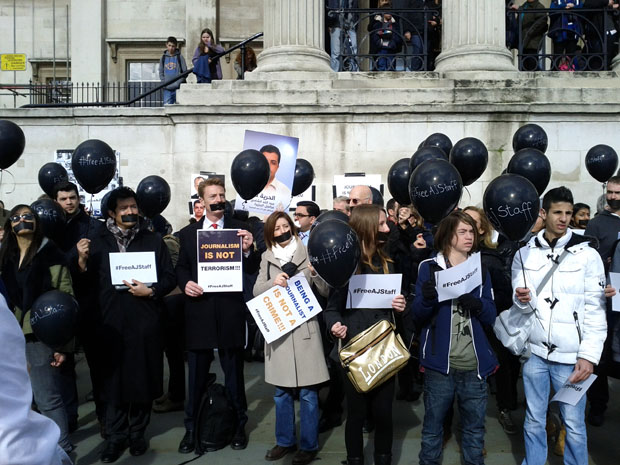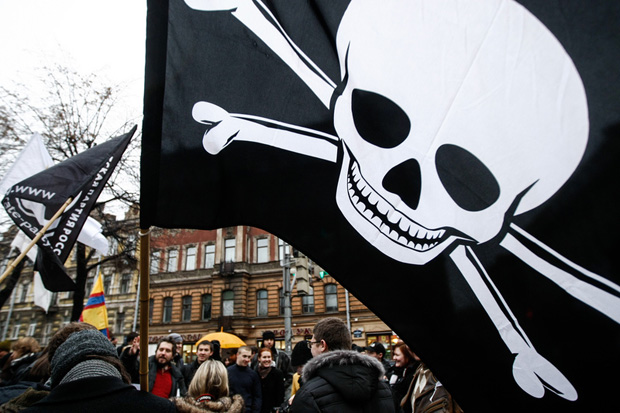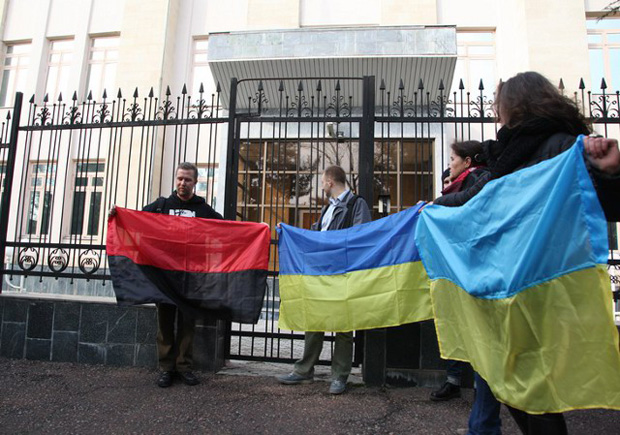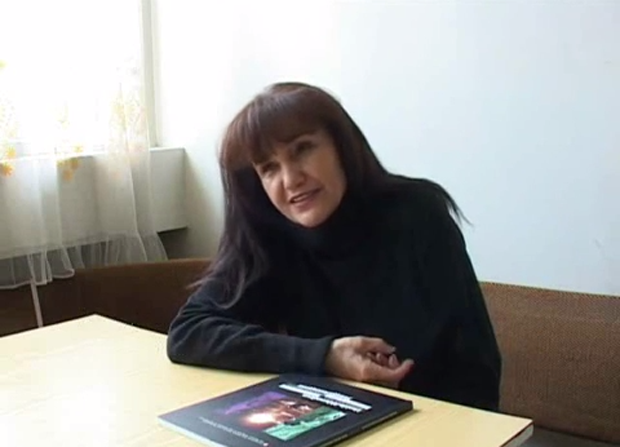2 Jun 2014 | Digital Freedom, News and features, Young Writers / Artists Programme

(Image: Shutterstock)
Unlike any previous time in the history of the world, there is a generation growing up today with unprecedented knowledge and power at their immediate and constant disposal. Their voices cannot be silenced, they can communicate with each other instantaneously from anywhere in the world. They are children of the internet, and they are politically and socially empowered in ways that are not yet clearly understood. Increasingly defining their identities online as much as offline, net-powered Millenials are collectively reshaping social norms — defining the legacy their generation will leave society. The internet is a product of, and a critical factor in, this legacy.
For example, the internet is a key medium for personal expression. Deliberately open-access and open-source architectures that transcend national boundaries means that the online world is a place where its users become increasingly accustomed to possessing both a platform and a voice regardless of their status in society. Even where it is dangerous to criticise politicians, or to practice a faith, or to be homosexual, the internet provides shelter in anonymity and the chance to meet like-minded people. In this way, the children of the internet have access to support, advice and assistance, but also to allies. Even the most isolated human can now take action with the power of a collaborative collective rather than as a lone individual, and they do so with an attitude that has become acclimatised to unfettered freedom of speech.
For the internet generation, this translates to their political actions online and often erupts into their offline behaviour, too. Online petitions gain infinitely more traction than their pen-and-paper twins, and the more anarchic side of the internet takes no prisoners in parodying public figures, as evinced recently with the numerous revisions of the recent “beer and bingo” tax cut advertisements produced by the ruling coalition. More controversially, Wikileaks infamously released hundreds of thousands of classified government communiqués, and “hacktivist” groups such as Anonymous make their presence felt with powerful retaliations against firms and governments that they perceive to have suppressed internet freedom. Even high-security sites such as the US Copyright Office and Paypal have been targeted — civil disobedience that is symptomatic of the new, sharing internet generation that is paradoxically mindful of personal privacy and disparaging of public opacity.
For the strongest demonstration of the way this attitude and power translates, look no further than the violent reaction of a primarily young body of protesters during the Arab Spring and in Ukraine. The internet was the conduit through which popular campaigns against ruling regimes transformed into widespread civil disobedience and a full-blown political movement. Empowered with access to forms of political commentary comparatively free of governmental intervention and the ability of every protester to act as a professional journalist by virtue of a camera phone and a Twitter account, the children of the internet communicated, mobilised and acted to cast away governments from Tunisia to Yemen; Egypt twice over. They made their voices heard: not at the ballot box as previous generations might have, but in the streets of Cairo and Sana’a and the virtual spaces of Facebook and Blackberry Messenger. Small wonder then, that governments targeted and blocked social networking sites to quell dissent. In many countries the internet was shut down altogether.
Yet, the internet persevered — as John Gilmore, co-founder of the Electronic Frontier Foundation noted: “The internet treats censorship as a malfunction and routes around it”. Despite the long running tussle between the users of the internet and governments who seek to regulate it, it remains untameable. In each instance, almost immediately after internet usage has been restricted, information has circulated about circumventing government regulations — even total shutdowns have been dodged through external satellite connections.
Powered overwhelmingly by the young, the internet is changing the way our societies are structured. Its effects upon our civilisation are poorly understood, particularly among young people who have never known a world without the internet. Ultimately, however, it has done more for individual freedom than any other development in the last half-century. It grants any person a voice with mere access to a keyboard and a broadband connection. It holds governments to account in new and innovative ways, and most crucially, it is an irreversible development. An entire generation defines itself, subconsciously, through the internet; previous such advancements came only through the invention of the printing press, radio and television. One thing is for certain — as broadband usage approaches saturation in many developed countries, we are all children of the internet now.
This article was originally posted on 2 June, 2014 at indexoncensorship.org
2 May 2014 | News and features

A London protest calling for the release of jailed Al Jazeera journalists in Egypt (Image: Index on Censorship)
Press freedom is at a decade low. Considering just a handful of the events of the past year — from Russian crackdowns on independent media and imprisoned journalists in Egypt, to press in Ukraine being attacked with impunity and government reactions to reporting on mass surveillance in the UK — it is not surprising that Freedom House have come to this conclusion in the latest edition of their annual press freedom report. This serves as a stark reminder that press freedom is a right we need to work continuously and tirelessly to promote, uphold and protect — both to ensure the safety of journalists and to safeguard our collective right to information and ability to hold those in power to account. On the eve of World Press Freedom day, we look back at some of the threats faced by the world’s press in the last 12 months.
1) Journalism is not terrorism…
National security has been used as an excuse to crack down on the press this year. “Freedom of information is too often sacrificed to an overly broad and abusive interpretation of national security needs, marking a disturbing retreat from democratic practices,” say Reporters Without Borders (RSF) in their recently released 2014 Press Freedom Index.
Journalists have faced terrorism and national security-related accusations in places known for their somewhat chequered relationship with press freedom, including Ethiopia and Egypt. However, the US and the UK, which have long prided themselves on respecting and protecting civil liberties, have also come under criticism for using such tactics — especially in connection to the ongoing revelations of government-sponsored mass surveillance.
American authorities have gone after former NSA contractor and whistleblower Edward Snowden, tapped the phones of Associated Press staff, and demanded that journalists, like James Risen, reveal their sources. British authorities, meanwhile, detained David Miranda under the country’s Terrorism Act. Miranda is the partner of Glenn Greenwald, the journalist who broke the mass surveillance story. Authorities also raided the offices of the Guardian — a paper heavily involved in reporting in the Snowden leaks.
2) …but governments still like putting journalists in prison
The Al Jazeera journalists detained in Egypt on terrorism-related charges was one of the biggest stories on attacks on press freedom this year. However, Mohamed Fahmy, Baher Mohamed, Peter Greste and their colleagues are far from the only journalists who will spend World Press Freedom Day behind bars. The latest prison census from the Committee to Protect Journalists (CPJ) put the number of journalists in jail for doing their job at 211 — their second highest figure on record.
In Bahrain, award-winning photographer Ahmed Humaidan was sentenced in March to ten years in prison. In Uzebekistan, Muhammad Bekjanov, editor of opposition paper Erk, is serving a 19-year sentence — which was increased from 15 in 2012, just as he was due to be released. In Turkey, after waiting seven years, Fusün Erdoğan, former general manager of radio station Özgür Radyo, was last November sentenced to life in jail. Just last Friday, Ethiopian authorities arrested prominent political journalist Tesfalem Waldyes and six bloggers and activists.
3) New media is under attack…
As more journalism is being conducted online, blogs, social and other new media are increasingly being targeted in the suppression of press freedom. Almost half of the world’s jailed journalists work for online outlets, according to the CPJ. China — with its massive censorship apparatus — has continued censoring microblogging site Sina Weibo, while also turning its attention to relative newcomer WeChat. In March, it closed down several popular accounts, including that of investigative journalist Luo Changping.
Meanwhile, Turkish Prime Minister Recep Tayyip Erdoğan has publicly all but declared war on social media, at one point calling it the “worst menace to society”. Twitter played a big role in last summer’s Gezi Park protests, used by journalists and other protesters alike. Only days ago, Turkish journalist Önder Aytaç was jailed, essentially, because of the letter “k” in a Tweet.
Meanwhile Russia has seen a big crackdown on online news outlets, while legislation recently passed in the Duma is targeting blogs and social media.
4) …and independent media continues to struggle
Only one in seven people in the world live in countries with free press. In many parts of the world, mainstream media is either under tight control by the government itself or headed up media moguls with links to those in power, with dissenting voices within news organisation often being pushed out. Brazil, for instance, has been labelled “the country of 30 Berlusconis” because regional media is “weakened by their subordination to the centres of power in the country’s individual states”. At the start of the year, RIA Novosti — known for on occasion challenging Russian authorities — was liquidated and replaced by the more Kremlin-friendly Rossiya Segodnya (Russia Today), while in Montenegro, has seen efforts by the government to cut funding to critical media. This is not even mentioning countries like North Korea and Uzbekistan, languishing near the bottom of press freedom ratings, where independent journalism is all but non-existent.
5) Attacks on journalists often go unpunished
A staggering fact about the attacks on journalists around the world, is how many happen with impunity. Since 1992, 600 journalists have been killed. Most of the perpetrators of those crimes have not been brought to justice. Attacks can be orchestrated by authorities or by non-state actors, but the lack of adequate responses by those in power “fuels the cycle of violence against news providers,” says RSF. In Mexico, a country notorious for violence against the press, three journalists were murdered in 2013. By last October, the state public prosecutor’s office had yet to announce any progress in the cases of Daniel Martínez Bazaldúa, Mario Ricardo Chávez Jorge and Alberto López Bello, or disclose whether they are linked to their work. Pakistan is also an increasingly dangerous place to work as a journalist. Twenty seven of the 28 journalists killed in the past 11 years in connection with their work have been killed with impunity. Syria, with its ongoing, devastating war, is the deadliest place in the world to be a journalist, while some of the attacks on press during the conflict in Ukraine, have also taken place without perpetrators being held accountable. That attacks in the country appear to be accelerating, CPJ say is “a direct result of the impunity with which previous attacks have taken place”.
This article was published on May 2, 2014 at indexoncensorship.org
25 Apr 2014 | Digital Freedom, News and features, Russia

A 2012 protest against internet censorship in St. Petersburg (Image: Mike Kireev/Demotix)
It’s been a bad week for the internet in Russia. On Monday, the founder and CEO of VKontakte — “Russian Facebook” — claimed to have been pushed out and that Putin loyalists are now in charge of the site. On Tuesday, the Duma adopted controversial amendments to an information law, targeting bloggers. On top of that, on the same day, opposition figure Aleksei Navalny was found guilty of slander over a Twitter post.
Pavel Durov said in a statement on Monday that not only had he been fired from VKontakte, but he had learned about it from the press. He added that Kremlin loyalists Igor Sechin and Alisher Usmanov now had “complete control” over the social network, and that “Probably, in the Russian context, something like this was inevitable”. He revealed in an interview with TechCrunch that he’s left Russia, and has no plans to come back — labelling the country “incompatible with internet business at the moment”. VK, as it is known, is not the go-to platform for political expression, its users are generally quite young. However, the site has recently found itself in the spotlight of President Vladimir Putin’s regime, both over groups and accounts connected to the ongoing conflict in Ukraine, and, Durov claims, over Navalny‘s page.
Meanwhile, claimed to be a counter-terrorism measure, the new law forces any site with more than 3,000 daily visitors to register with authorities. It will then be considered a mass media outlet, with the potential of being subjected to blocking and fines for anything from failing to verify information posted, to using curse words. Bloggers could also be held responsible for comments posted by third parties on their site, while anonymous blogging may or may not be banned. If enforced, it would “curb freedom of expression and freedom of social media, as well as seriously inhibit the right of citizens to freely receive and disseminate alternative information and express critical views,” said the OSCE Representative on Freedom of the Media, Dunja Mijatovic.
While the amendment has yet to be signed into law, it appears to have already made an impact. Russia’s biggest search engine Yandex has removed its ranking of the country’s most popular bloggers, saying it is because the blogsphere has peaked and is losing ground to social media as a discussion platform. Incidentally, their decision was announced only days before the Duma representatives made theirs.
But these cases are merely the latest chapters in the ongoing saga of Russian internet censorship. While to some extent, the authorities have kept an eye on the internet since its inception, there was a time not long ago when their attention was firmly fixed on controlling the traditional media. But as TV news turned into little more than government propaganda machines (see the bizarre spectacle that is RT) Russians started looking for alternative platforms for real debate. Unsurprisingly, they found them on the internet, and it proved a relatively free space. The remarkable popularity of blogging site LiveJournal in Russia is one result of this; the rise of independent online news providers like Lenta.ru another.
But even then, there were those who realised the regime would turn its attention to the internet as soon as it clocked onto its potential power. And sure enough — the wave of internet repression we’re seeing today is widely believed to have started with the protests surrounding the elections securing Putin’s third term in power. Like the Arab spring, here too the internet was an effective organising tool.
Since then, continuous blocking and takedowns have been supplemented by more large-scale crackdowns, like the 2012 blacklisting of websites, and the range of attacks on online news sites, such as Lenta.ru, TVRain and Ekho Moskvy, early this year. And while there are immediate and obvious effects of putting government loyalists in powerful media positions or simply shutting down outlets that show any sign of dissent from the official line, these actions also pose less overt threats to free expression.
“We should understand one thing — while technically these initiatives look not very sophisticated, in fact the entire strategy is very efficient because it provokes the rise of self-censorship among users, ISPs and even global platforms,” renowned Russian investigative journalist Andrei Soldatov explained to Index. “Many are becoming more and more cautious facing government pressure on the internet, not very predictable, and thus extremely dangerous.”
There is little reason to believe that authorities will call it a day with their latest moves. “Every time we wonder, is it possible to have more propaganda and more pressure, but then it turns out it is possible,” Tonia Samsonova, a correspondent for Ekho Moskvy and TVRain told Index. She says people used to believe they lived in a free society, or one that was on its way to becoming free, but then the situation deteriorated. And every time they think they’ve hit rock bottom, “someone is knocking from the underground and we realise we can go lower and lower and lower in terms of freedom,” she says. “And I think there is a lot of room for making things worse for internet freedom in Russia.”
Soldatov believes a possible next step involves forcing the likes of Google and Twitter on to Russian soil: “It’s very probable, given that some prominent Russian MPs already started putting global platforms under pressure (using as pretext the protection of personal data of Russian citizens against NSA espionage). The very last initiative was to forbid Facebook in Russia until the company relocates its servers with Russian citizens data on Russian soil, notably in Siberia, because it might help develop this region.” This initiative has not yet been made into a draft bill, but Soldatov says “the trend is quite obvious”.
Indeed, on a related note, recently passed legislation orders websites — including foreign ones with Russian users — to keep six-month records of user activity, and for that to be made available to the authorities. Whether big internationals like Facebook will comply when challenged remains to be seen.
“Their ultimate goal is to have no oppositional thinkers posting,” says Samsonova. With few signs of widespread public opposition to the authorities’ previous repressive moves, further erosion of internet freedom on the path towards this goal seems likely.
This article was posted on 25 April 2014 at indexoncensorship.org
17 Apr 2014 | Europe and Central Asia, News and features, Uzbekistan

Umida Akhmedova took part in a small protest in Tashkent, in solidarity with the Euromaidan movement.
On 27 January, internationally renowned photographer Umida Akhmedova, her son Timur Karpov and seven other people took to the streets of Tashkent, Uzbekistan. Armed with Ukrainian flags, cameras and a petition, they staged a peaceful protest in solidarity with the Euromaidan movement.
Knowing they might attract unwanted attention, the group, which included one journalist reporting, posed for a few photos outside the Ukrainian embassy, handed over the petition, and quickly wrapped up the demonstration. However, their worries soon proved valid. Three days later, the protesters were hauled in one by one by police for a “short talk”. They would be held incommunicado for one day, first in a central Tashkent police station and later at a more remote location.
Karpov, a photographer based in Russia, told Index about unprofessional and aggressive officers, who called the protesters “dissidents” who were “ruining the constitution”. Passports and phones were taken away, but Karpov managed to keep one concealed to alert the outside world to their detention. It was eventually discovered and confiscated. When he got it back, it had been completely wiped. Without access to lawyers, the protesters were questioned by the SNB — the KGB’s successor — before being put through a quickie court session and ordered to pay fines of some £1,200. Three of them have been sentenced to 15 days in prison. Justice, as understood by Uzbekistan’s notoriously repressive regime.
This is not the first time Akhmedova has run into trouble with the regime of former Communist Party official Islam Karimov. In 2009, the photographer and documentary film maker, whose work has been published in The New York Times and Wall Street Journal, was charged with “damaging the country’s image” over a series of photographs depicting life in rural Uzbekistan. Similar charges were later levelled at her over a film about challenges facing Uzbek women, and in 2010, over a book about Uzbek traditions. It’s worth noting that she never intended to make a political statement with her work — the authorities’ reaction is what has politicised it. The cases have made Akhmedova a credible voice of opposition, and while her high profile provides some protection, it also means her every move is noted — as the latest case shows.

Umida Akhmedova (Image: Uznewsnet/YouTube)
“We live in a strict, archaic society, where all unregulated acts, especially those that can cause some kind of a response in the society, are nipped in the bud,” she told Index. “In the case of our Maidan project, the authorities did not have to be clairvoyants to see the similarities between the situation in Ukraine and the one in Uzbekistan. The government has started scaring children and adults with the word Maidan and did not like it when we showed support for Maidan.”
“As for our previous case,” she adds “we were charged with slander and insult of Uzbek nation, because the government wanted to teach us a lesson that without the approval from above, we were not allowed to film anything or publish books, or generally, do anything artistic without a superior permission.”
While Akhmedova’s latest arrest hit headlines across Central Asia, the story made little impact in the west. This is not surprising. Earlier this year the soap opera-like falling out between first daughter Gulnara Karimova — businesswoman, sometimes pop star, and until recently tipped to follow in her father’s presidential footsteps — and, seemingly, the rest of the family was covered by media outside the country. But on the whole, Uzbekistan rarely commands international attention. Like many other countries in the region, it is able to carry out its repressive rule away from the global spotlight.
President Karimov, by taking a number of liberties with the country’s constitution and term limits, has been in power since it gained independence from the Soviet Union in 1991. Reports of torture and other power abuses are widespread, the darkest days of the regime coming with the Andijan massacre, where security forces killed hundreds of people in the aftermath of a peaceful protest. The country is also one of the most corrupt in the world and despite its gas resources — part of the reason for many western sanctions quietly being dropped — suffers “recurring energy crises“. But Karimov has been careful to remove nearly all institutions that might use this information to challenge his power. Uzbekistan has no official opposition parties and no press freedom to speak of. Opposition news sites that operate outside of the country are blocked. Karpov puts it simply: “There is no freedom of expression in Uzbekistan. Absolutely none.”
One aspect of the widespread press censorship, is that developments in Ukraine have been met with near media blackout in Uzbekistan — the same way authorities dealt with the Arab spring and other incidents of popular unrest outside the country’s borders.
“From my point of view, they’re afraid. Extremely afraid of any sort of freedom,” says Karpov. ” That’s why they made the case with us. To frighten us. To show to other people that if you do this, you will be sentenced.”
Mother and son have accepted their punishment — partly because refusal to do so would lead to further blacklisting, and partly because they weren’t alerted to their appeal until after it had taken place. Unsurprisingly, the sentences were not overturned.
Despite this latest setback, and the possibility of being handed down a travel ban, Akhmedova remains undeterred. “Nothing has changed for me. I will carry on ‘slandering’ as I have done,” she says. “The state cannot help or stop me.”
This article was originally posted on 17 April 2014 at indexoncensorship.org





